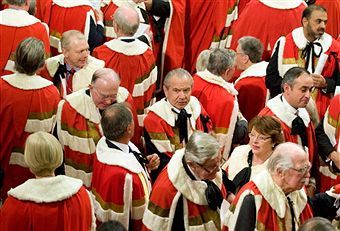 ‘Constitutional reform is a waste of time, pure and simple. It never actually
achieves its avowed end of reconnecting the voters with democratic institutions,’ wrote John McTernan, the former advisor to Tony Blair,
recently. There are signs that the current government agrees.
‘Constitutional reform is a waste of time, pure and simple. It never actually
achieves its avowed end of reconnecting the voters with democratic institutions,’ wrote John McTernan, the former advisor to Tony Blair,
recently. There are signs that the current government agrees.
Nick Clegg has unveiled the next stage of his constitutional reforms
today by revealing draft plans to reform the House of Lords. The coalition speaks in unison in
public: the Cabinet discussed reform last and apparently there was “very strong support for the proposals around the table”. But dissenting voices must have sounded in private.
The inestimable Rachel Sylvester reveals (£) that Clegg’s draft is very rough. There is
no agreement on the precise remit of the second elected chamber, its exact make up, whether there’ll be party lists, what will happen to the crossbenchers, what it will be called and when the
bill will finally come before parliament.
After 5 May’s disappointment, Lords reform was supposed to be Clegg’s mark on the coalition. But his ambitions have calmed before the disquiet spreading across both coalition benches.
Tories insist that fundamental constitutional change should not be a salve to the deputy prime minister’s wounds, especially as the public was so overwhelmingly contemptuous of electoral
reform.
The Liberal Democrats are split. A source close to Clegg tells Sylvester that the AV referendum result has forced Clegg to cede ground, hoping for a compromise. But others oppose the plans
outright: former leader Lord Steel has co-signed a letter to MPs warning that
the proposals pose a threat to the supremacy and authority of the House of Commons.
Beyond that, there are those who object to losing crossbench
expertise in the partisan scrum of an elected Upper House.
Plainly this bill will require vast amounts of parliamentary time – a commodity that the coalition is rapidly expending with its extensive public service reforms, against which the parties
will be judged in 2015. Small wonder then that David Cameron once privately referred to constitutional reform as a
“third term issue”.
David Blackburn
Clegg’s great rejuvenator falls a little flat






Comments